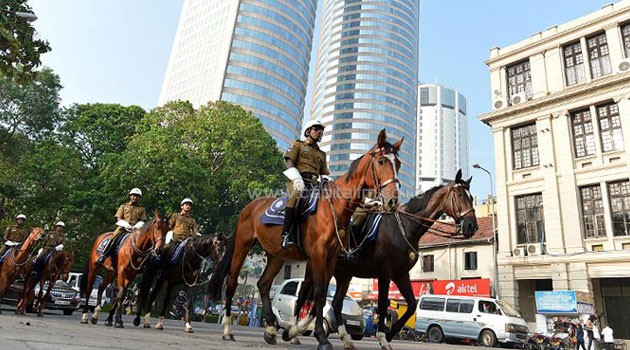
Sri Lankan traffic policemen on horseback patrol a street in Colombo, on November 14, 2013, ahead of the Commonwealth Heads of Government meeting/AFP
More than four years after the end of one of Asia’s bloodiest ethnic conflicts, President Mahinda Rajapakse will host dozens of leaders from every continent.
The biggest such event in Sri Lanka since the 1976 Non-Aligned Movement summit was meant to have been a chance for the Sinhalese nationalist leader to showcase the development of his country since government troops crushed the Tamil Tiger rebels in May 2009.
Since the war, the economy has enjoyed growth rates of up to 8.2 percent and more than one million tourists visited Sri Lanka last year – a new record.
But after refusing to bow to demands for an independent investigation into the end of the conflict, Rajapakse is now confronted by a public relations disaster.
The prime minister of Canada, Stephen Harper, was the first to boycott after his government said the summit was akin to “accommodating evil” while his Mauritian counterpart Navin Chandra Ramgoolam – due to host the next one – is also refusing to attend.
Even India’s Prime Minister Manmohan Singh is staying away, seemingly preferring to jeopardise ties with a neighbour rather than offend Tamil voters ahead of next year’s elections.
The agenda for the three-day summit, which will be opened by Britain’s Prince Charles, includes sessions on debt restructuring and climate change.
But Rajapakse has had to spend the build-up fending off allegations that his troops were responsible for the death of some 40,000 Tamil civilians in the final weeks of the war.
During a feisty eve of summit press conference, the 67-year-old leader said his administration deserved credit for managing to bring an end to the conflict.
“People were getting killed for 30 years, at least after 2009 we have stopped it,” he said.
“There is no killing in Sri Lanka today.”
At least 100,000 people lost their lives in the conflict which began in 1972.
The northern Jaffna peninsula, home to around 800,000 Tamils, was the main battlefield.
Before the war, Jaffna had a flourishing economy – second only in terms of wealth to Colombo.









































